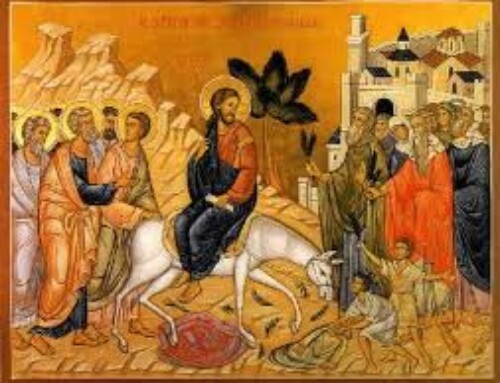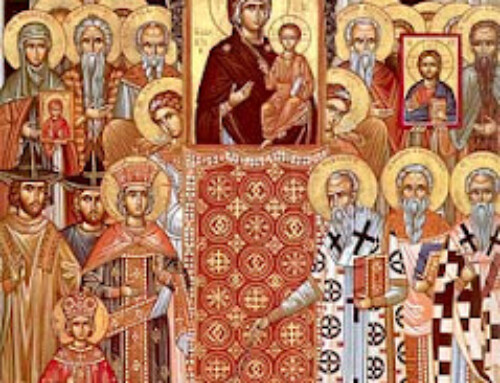THE WORD MAGAZINE, MARCH 1990 PAGE 8-9
THOUGHTS ON JUDAS
by Cheryl Morris
At every Divine Liturgy we pray and sing the prayers of preparation for Holy Communion which include this phrase, “ . . . neither will I give thee a kiss as did Judas.” I have often heard sermons which state that Judas committed suicide because he did not believe he would be forgiven. Thus, his major sin seems to be lack of faith. However, I have often wondered, WHY DID JUDAS BETRAY CHRIST? Judas had been with Christ, had seen Christ heal the sick and work many miracles, and had even been named one of his apostles. So why would he do such a thing to our Lord?
The Bible is filled with many instances of people just like Judas. One has only to think of the Jews led by Moses to find an example almost as profound. The Jews had suffered terribly under Egyptian oppression and then came Moses who prophesied each of the plagues which would come upon Egypt if the Jews were not freed. The Jews saw each prophesy come true and eventually were freed, only to be chased by the Egyptians to the Red Sea which miraculously parted for them and consumed the Egyptians pursuers. During the forty years they wandered the desert, the Jews were provided miraculously manna from heaven so they would not starve. God cared for them and it was during that very time when God was providing for them that they turned to other gods. Why did they build the golden calf and start worshipping it while Moses was gone on Mount Sinai conversing with God?
According to Aaron, they were prone to evil, they had grown impatient when Moses had left and they had decided that since they did not know what had happened to Moses, they would decide what they should do next. According to God, who had seen this all happening and sent Moses down the mountain with the Ten Commandments, these people had done it because they were “a stiff-necked people” (Ex. 32:9). Left to their own devices, the Jews had made the wrong decisions; God no longer existed for them because they needed constant reminders; and so they began to live as if God did not exist and make up their own god of precious metal. This was a god they could see and understand. It was a god they could physically carry with them. This was an immediate god, an instant god, and a god who could impress others visibly with its wealth — that shining, shining gold. This was a god the Jews could manipulate to be what they wanted their god to be. Instead of standing up for what is right, they had all followed the crowd and the standards of this world. Left without Moses, they could decide whether they would follow God, and they turned their backs on Him.
How does this relate to Judas? Yes, Judas had, like Moses’ Jews, seen many miracles. He knew what was right and wrong. He had even been chosen by Christ, just as the Jews had been chosen. In Matthew we read in the verses immediately preceding Judas’ betrayal that Jesus was in Bethany in Simon the Leper’s home and a woman anointed Jesus’ head with a jar of expensive perfume. According to Matthew, some of the disciples (he does not say whom) were indignant and asked why this perfume was being wasted when it could be sold and the money could be given to the poor. Mark’s account follows that of Matthew. But John’s account is more specific — it was Judas Iscariot who objected to this “waste”. In fact, John even explains Judas’ motivation. “He did not say this because he cared about the poor but because he was a thief; as keeper of the money bag, he used to help himself to what was put into it,” (Luke 12:5-6).
Is this what prompted Judas to betray our Lord? This appears to be the case, for according to Matthew and Mark, Judas then went to the chief priests and asked what they would give him if he handed over Jesus. What did he get? Money — thirty pieces of silver, shining, shining silver. Something immediate, something he could control, something he understood — something physical.
However, scripture also provides us with another motivation for this betrayal. Judas had often heard Jesus speak of His burial. Perhaps Judas did not want to join Christ in His Martyrdom. Perhaps he could not face mockery and derision. It is great to be perceived by our peers as being on a winning team, being a part of the “in crowd”, the movers, and the shakers, but when our peers no longer see us that way, when we seem to no longer have that power, then our faith is really tested. Then we have to choose between what is right and wrong, ethical or non-ethical, moral or immoral —then we have to decide whom we will serve: God or Satan. Judas loved money and himself more than he loved God. The Evil One knew this and entered him. The love of money and oneself cannot reside in a person’s heart along with the love of Christ. A person can either empty his heart of the love of money and self or empty his heart of the love of Christ. When the love of Christ is shoved out of one’s heart, we have cooperated with Satan, become his accomplices, and Satan rushes in to try to fill that void.
Does scripture support the theory that Judas was motivated to betray Christ not just because of his love of money but also because of a self love, a self love which was founded upon fearing to lose his life and his position among his peers? We have to say yes when we look at the way he chose to betray Christ. Acting as if God were not real, as if God did not know what he had done when he thought he was out of God’s sight, Judas betrayed our Lord with a kiss and fled. In fact, according to Luke, Judas plotted and “watched for an opportunity to hand Jesus over to them when no crowd was present,” (Luke 22:6). Instead of standing up, pointing to Christ and saying “There he is. Get him,” Judas had a secret sign, a kiss, something which might appear innocent and loving to the followers of Christ. He also sought to betray Christ with as few witnesses as possible. How ironic that Judas feared people more than he did God.
St. John of the Ladder talks of this kind of fear when he says, “For I have seen men who were going to steal and were not afraid of God, but, hearing the barking of dogs, they at once turned back . . . Let us love God at least as much as we respect our friends. For I have often seen people who had offended God and were not in the least perturbed about it. And I have seen how those same people provoked their friends in some trifling matter, and then employed every artifice, every device, every sacrifice, every apology, both personally and through friends and relatives, not sparing gifts, in order to regain their former love.” (7)
Thus, it appears that Judas betrayed our Lord out of love of money and love of self. Sadly enough, even when he felt remorse for what he had done, he did not ask for forgiveness but he killed himself. He was sad that he had done this, but perhaps not sad enough to give up his pride and ask for forgiveness and so he lost his life twice: once when he hanged himself, he died physically and then the second time when he stubbornly refused to repent, he lost his second chance at eternal life with Christ.
So this is what we mean when we pray at every Divine Liturgy: “neither will I give thee a kiss as did Judas.” We are saying that we will not betray Christ under any circumstances. Well, some might say, that is easy enough to do because Christ is not physically present, so I do not have to worry about whether I could “give Him a kiss as did Judas.” But we do betray Christ in many ways. We are supposed to be His disciples just as Judas was. We go to church regularly, kiss His icon, worship Him and declare our love for Him. All this is fairly easy for us to do. The services of the Church are glorious and awesome, just as the parting of the Red Sea and Christ’s miracles were. But what do we do at other times, when God’s presence does not seem so spectacular? How do we make decisions about our families, our friends, other people, the daily business of our jobs, our organizations, clubs, or our church in our day to day life? Are we ethical, moral, and God-fearing and loving in these decisions? It is not always so black and white, however.
In fact, more often than not, we try to find reasons which justify our actions so that we do not appear to be doing that which we are actually doing. Like Judas with his kiss, we try to mask something bad with something which appears to be good. Sometimes the love of money and ourselves has overcome us so much, that we do not even realize we are covering up our bad deeds. For example, how many of us have gone to someone who has hurt us in the past and repeated some malicious gossip being spread about him/her to him/her, saying that we are only telling him/her because we care? Or maybe we approach our priest and request that he do something which is against the Faith — bend a little — because there are people threatening to leave the church if he does not and the church cannot afford (financially) to lose them? The examples are numerous. Sometimes children try to get their parents to allow them to do something which is wrong but do not tell their parents the whole truth. Sometimes we manipulate people in our families or in our jobs to put ourselves in a position where we can direct their lives, making these people depend upon us emotionally or even financially so that we can become more self important. But this does not have to be.
Even if we have done these things, we still can change. We can still repent. Scriptures show us that, too. When Moses returned and saw that the people had become wild, he asked them, “Whoever is for the Lord, come with me.” Those who joined him, repented, and lived. Those who did not, died. Some people who had joined him saw their brothers, friends and neighbors then die, but they did what God told them to do — what was right. Jesus had prophesied that Peter would deny Him, which Peter did. But Peter repented and followed our Lord even unto martyrdom and thus eternal life. Thus there is even hope for us. The secret lies in a constant self-examination so that when we sin we can repent as quickly as possible. As soon as Peter denied Christ the third time, he repented and wept bitterly. Judas allowed his sin to become even bigger. He sinned by turning Jesus over to others and in turn they sinned by crucifying Christ. Judas felt remorse and tried to deny his part in it by returning the silver, but he could not undo his deed. Also, because of his pride, he could not approach our Lord and repent.
Sometimes we find ourselves in a similar position as well. We sin and involve others in our sins, thus expanding our sin. We feel safety in numbers. We can excuse ourselves by saying that everyone does it or that we are not nearly as bad as the others. Our pride prevents us from taking total blame before others and really exposing our motivation for our sins before those whom we cause to sin further and before God. We do not want others to see that darker side of ourselves. Yet God knows us and our hearts. We cannot hide from Him. And it is God’s judgment we should fear, rather than man’s. Man’s judgment cannot kill us forever. Also, if we stand before others and openly admit our sin, the light of Christ will overcome the darkness within us, and gradually through prayer, fasting, and repentance we can be sure that God will reveal to others what kind of people we are. God is the only one who should judge us anyway. We have to have the kind of faith that Judas lacked. What would have happened had Judas repented? He would have been forgiven. Perhaps he might have grown in Christ and might have been an example for all those who sinned in crucifying Christ. Perhaps many others would have had their hearts soften into repentance. But Judas’ heart had hardened through the process of continuously being unrepentant about his sins: he loved money; he loved money so much that he stole from the disciples’ treasury; he loved money so much that he could not stand to see an expensive perfume “wasted” by anointing Jesus; he loved money and himself so much that he sold his Master out for thirty pieces of silver so that he could make money for himself and at the same time distance himself from a martyrdom he might have as one of Christ’s followers; he loved himself so much that he thought he could do this without God seeing him, so he boldly returned to Christ and kissed Him; he loved himself so much that he sought to reveal his Lord when few were around so he would not have his deed exposed to the masses; he loved himself so much that he even sought to hide his deed from the small crowd at the betrayal by giving Jesus a kiss to mask his dirty deed; and then he loved himself so much that he could not give up his pride and repent. One sin provided the foundation for the next sin. This is true in our lives as well.
Thus it is important to know why Judas sinned. It is important to look behind the sin itself and see why this bad fruit was produced. This is what we are all called to do daily. If we look at Judas only as the one who betrayed Christ, we miss a very important part of the story. For he is an example for us as to how we can betray Christ and of how one sin can compound itself until it has developed into a whole network or way of life of sin which, unrepented, can harm us and those with whom we associate. Our choice is this: do we want to be a Judas or do we want to be a Peter? Why did Judas do what he did? Why do we do what we do?
Cheryl Morris is the Khoureeye at St. John Chrysostom Church in Fort Wayne, Indiana.



